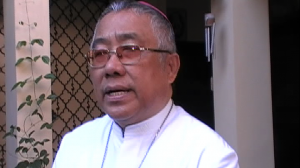Bishops accept Catholic vote not yet at its full strength in elections
MANILA, Philippines — The Catholic Church’s efforts to sway the electorate into supporting senatorial candidates it deemed good for the country ended in disappointment.
Lipa Archbishop Ramon Arguelles, who had publicly endorsed senatorial bets who fought the reproductive health law, said on Tuesday he was not at all happy with the outcome of the elections, because most of the senatorial bets in the winning circle had supported the controversial measure.
“I am not happy but I am resigned [that] the country is not yet ready for better things,” Arguelles told the Philippine Daily Inquirer in a text message on Tuesday.
The prelate said Church organizations had tried their best to guide the electorate but apparently the attempt was wanting. “We tried our best but it was not good enough,” he admitted.
During the campaign season, the Diocese of Bacolod put up a large tarpaulin bearing the names of candidates who opposed the RH bill and branded them as “Team Buhay” while those who voted for it as “Team Patay.”
Article continues after this advertisementThe diocese, under the leadership of Bishop Vicente Navarra, also led a rally weeks before the May 13 elections, encouraging its parishioners to vote for candidates that would continue to fight against the RH law in the Senate.
Article continues after this advertisementThe White Vote Movement led by Bro. Mike Velarde and his influential charismatic group El Shaddai also endorsed at least nine senatorial candidates who stood with the Church in opposing the family planning law.
These candidates were Miguel Zubiri, Richard Gordon, Mitos Magsaysay, Gringo Honasan, Nancy Binay, JV Ejercito, Koko Pimentel, Antonio Trillanes IV and Cynthia Villar.
Arguelles also admitted that Grace Poe’s surprising big win somehow put into question the influence of the Church and charismatic groups. “That means, showbiz is more influential than spiritual and moral force as of now,” he said.
Over Church-run Radio Veritas, Jolo Bishop Angelito Lampon said the elections were still a name recall and popularity contest. “But we cannot blame the D and E electorate. It will take time for Filipinos to be politically mature.”
“We should go back to political parties with clear platform of government,” he added.
Antipolo Auxiliary Bishop Francisco De Leon, also currently the administrator of the Diocese of Caloocan, expressed dismay over the results of the elections. De Leon said he had hoped that Filipinos already learned from the past mistakes that caused many sufferings for the country.
But for Archbishop Emeritus Oscar Cruz, the so-called “Catholic vote” was not at all absent during the May 13 balloting as could be gleaned from the partial unofficial tally by the Commission on Elections.
“I think one indication that it worked somehow is that Buhay party-list is leading the count,” Cruz told the Inquirer in a phone interview. He also noted that the “Catholic vote” also worked at least for some of the “pro-life” candidates.
Out of the nine endorsed by the White Vote Movement, six of them were in the winning circle as of Tuesday’s count. These included Binay, Ejercito, Honasan, Pimentel, Trillanes and Villar. Only Richard Gordon, Miguel Zubiri and Mitos Magsaysay failed to break into the ranks of the winners.
Five out of the six senatorial candidates of the so-called “Team Buhay” were also in the winning circle. The team included Ejercito, Honasan, Trillanes, Pimentel, Villar and Magsaysay.
“So to me, whether the so-called ‘Catholic vote’ worked or not, it is hard to answer because there are some that were endorsed who are in the winning circle and there are some those who are not like Magsaysay and Zubiri,” said Cruz, former president of the Catholic Bishops’ Conference of the Philippines.
But he clarified that the so-called “Catholic vote” only referred to organizations affiliated to the Church.
“If you will say Catholic vote, it will have to come from the CBCP as representative of the Catholic Church of the Philippines. But these Catholic organizations and movements also have a right to call theirs as ‘Catholic vote’ because they are also Catholics,” he explained.
Cruz added that he was not surprised that Poe was leading the Senate count because for one, he believed in her potential as a lawmaker based on her answers in the debates and interviews she attended during the campaign season.
Second, her stellar performance was somehow a vindication for her father, the late Fernando Poe Jr., who ran for the presidency in 2004 but lost to former President Gloria Macapagal-Arroyo, said Cruz. Arroyo had been accused of cheating by the political opposition led by Joseph Estrada and Fernando Poe Jr., during her presidency and that Poe was supposed to be the winner.
“Third, she was also endorsed by former President Joseph Estrada,” added the retired prelate.
